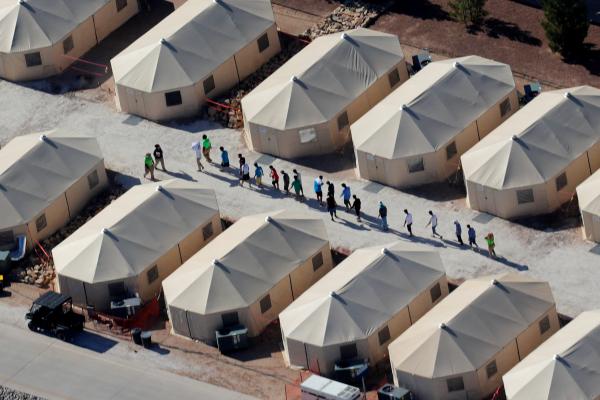Last week, the New York Times reported that the Trump administration has been quietly moving immigrant children in the dead of the night to a tent city in Tornillo, Texas. Last month, the Washington Post reported how officials denied passports to hundreds, or even thousands, of U.S. citizens born in Texas, alleging their birth certificates are fraudulent. On the same day — when President Trump was asked about updated reports that 2,975 people died in Puerto Rico in the aftermath of Hurricane Maria — he called the racist federal neglect that led to their deaths a “fantastic job.” Meanwhile, the number of detained migrant children has skyrocketed to 13,000, while officials estimate they may have lost track of 1,500 kids. All of these abuses, when viewed in conjunction with other extreme policies from this administration, reveal a devastating pattern: an effort to make white supremacy public policy. Indeed, amid this chaotic administration, the systemic abuse of people of color is consistent.
This is not only a political crisis, but a deep moral and spiritual reckoning. At the core of this presidency sits a campaign of overt dehumanization. Language that names Latinx people as rapists, drug dealers, and murderers sets the stage for attacks on their citizenship. Allegations that Puerto Ricans simply want everything handed to them seek to lay blame on the victims of catastrophic disaster mismanagement, and thus excuse their deaths. Rhetoric that labeled migrants as animals is inextricably tied to policy that stole their children. We are being told, in no uncertain terms, that some people’s lives are less important, and thus less deserving of equal protection under the law.
These attacks on people’s innate dignity and sacred worth assault our most cherished moral and religious values. We read in Genesis that all people are made in the image of God. In Paul’s letters, he proclaims that in God earthly divisions fall away, that all people form part of God’s body. Jesus himself promises: Whatever you do to the least of these, you do to me. Attempts to excuse human rights abuses committed against some people are thus not just unconstitutional — they assault God by denigrating and desecrating that divine, indwelling spark.
White supremacy enshrines whiteness as ultimate concern. It’s an idolatrous embrace of racial grievance that corrupts the rest of the gospel. As Christians we are called to worship God and embrace God’s loving justice, not dehumanize our brothers and sisters. Faced with such clear political immorality, we are all left with a choice: Will we be faithful to the God who calls us to love our neighbors as ourselves or will we follow the sinful voices that tell us some neighbors aren’t worthy of our concern? It is a crossroads that cuts to the core of who we are, and who government is called to serve.
On this question, the Bible is unambiguous. Through the prophet Isaiah God proclaims, “Woe to those who make unjust laws, to those who issue oppressive decrees, to deprive the poor of their rights and withhold justice from the oppressed.” Through Amos, God likewise condemns rulers who “lie on beds adorned with ivory and lounge on your couches … but do not grieve over the ruin of Joseph.” In his first sermon, Jesus himself says that God sent him “to proclaim good news to the poor … freedom for the prisoners and recovery of sight for the blind, to set the oppressed free.” How, then, are we called to respond to a government that deliberately inflicts suffering on our nation’s most vulnerable?
This spiritual crisis has laid bare a corresponding struggle within Christianity. In August, 100 mostly white evangelical leaders gathered at the White House to praise the Trump administration, name its work godly, and provide spiritual cover for its agenda. At the dinner, Franklin Graham said of our present situation, “This is a spiritual warfare, this is a battle.” Meanwhile, last week, Jerry Falwell tweeted, “Christians need to stop electing ‘nice guys’ … the US needs street fighters like President Trump.” There is a grain of truth to these statements: We are enmeshed in a battle for the soul of Christianity. When ministers bless an openly white supremacist administration, they make a mockery of our faith and reveal their true allegiance is to unjust power — not God. Jesus had strong words for faith leaders who abuse their position: “You snakes! You brood of vipers.” Today, ministers must be equally forceful in calling out such clear heresy.
We live under increasingly authoritarian governance; the need to resist its continued development could not be more urgent. An administration that is allowed to simply move on after 2,975 people died on its watch will feel no compunction disregarding victims of future disasters. A government that doesn’t face widespread outrage for trying to denaturalize citizens will continue this odious effort. A president who doesn’t face serious consequences for taking children from their families will simply learn that he can violate migrants’ rights and get away with it.
Christians have a moral obligation to oppose bigoted policy. This calling is not incidental to our faith, but rather emanates from the very heart of the gospel. And, particularly when ministers bless this unholy mess, it is crucial that we center our resistance squarely in our faith — and condemn as heresy any effort to cloak political abuse in a godly shroud. Protest this immorality — find ways to stand in solidarity with its targets.
Got something to say about what you're reading? We value your feedback!






